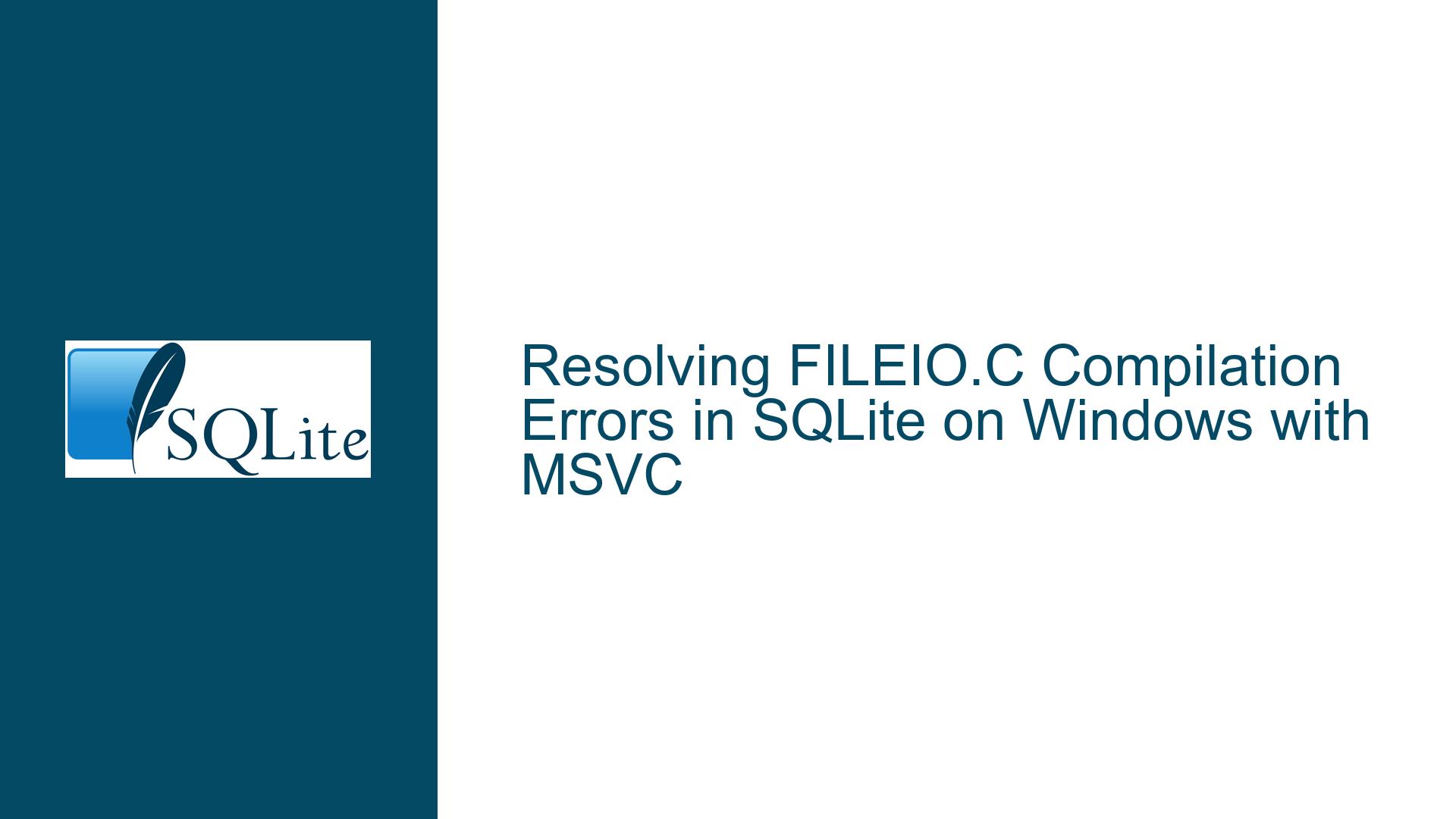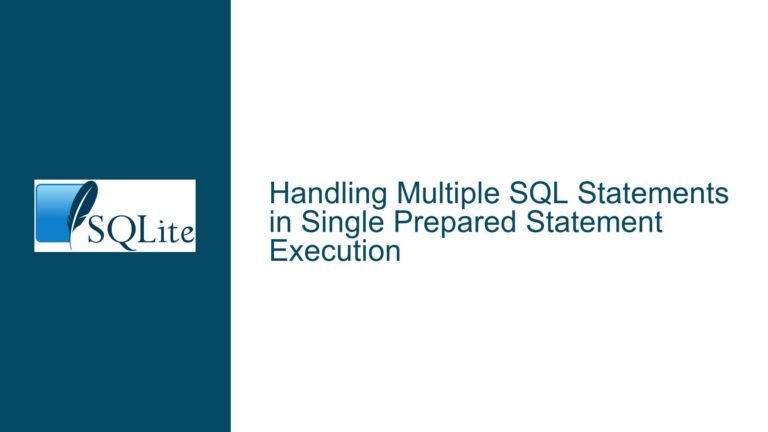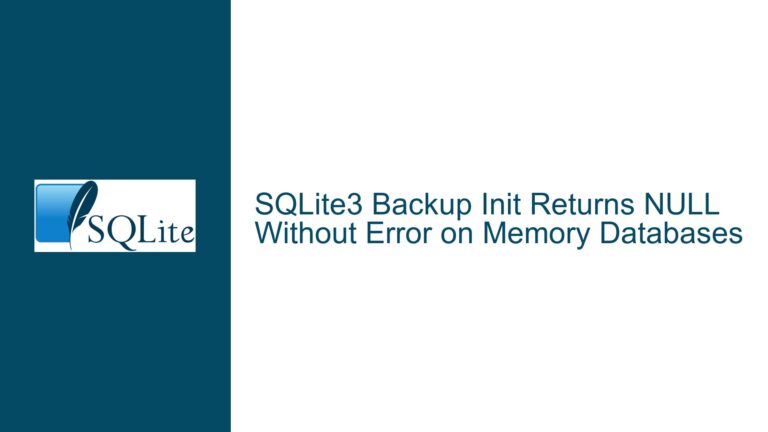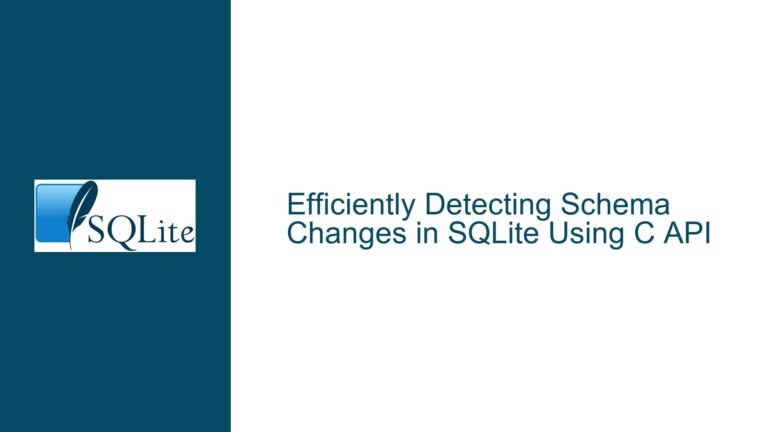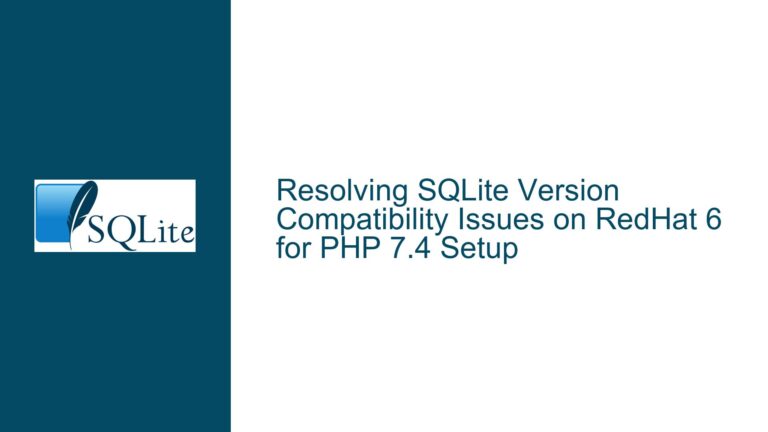Resolving FILEIO.C Compilation Errors in SQLite on Windows with MSVC
Missing Headers & Environment Misconfiguration During FILEIO Extension Compilation
The core issue revolves around compiling the SQLite FILEIO.C extension into a loadable DLL on Windows using Microsoft Visual C/C++ (MSVC). Users attempting to follow the SQLite documentation for compiling loadable extensions encounter fatal compilation errors related to missing header files (C1034, C1083) and unresolved linker errors (LNK2005, LNK2019, LNK1120). These errors stem from environmental misconfigurations, missing dependencies, and nuances specific to the FILEIO.C extension’s reliance on internal SQLite functions when targeting Windows.
Root Causes: Environment Variables, Header Paths, & Symbol Conflicts
1. Unconfigured MSVC Development Environment
The Microsoft C/C++ compiler (CL.exe) and linker (LINK.exe) require environment variables (INCLUDE, LIB, PATH) to locate system headers, libraries, and tools. These variables are not set by default in a standard Command Prompt. Attempting to compile without initializing the MSVC development environment leads to C1034 errors ("no include path set"), as the compiler cannot find standard headers like <windows.h> or <stdio.h>.
2. Missing SQLite-Specific Headers
The FILEIO.C extension depends on non-public SQLite headers (test_windirent.h) and amalgamation headers (sqlite3ext.h, sqlite3.h). These files are part of the SQLite source tree but are not included in the default distribution or placed in system directories. Without explicit inclusion paths (-I flag) or local copies, the compiler throws C1083 errors ("Cannot open include file").
3. Symbol Redefinition & Linker Conflicts
The FILEIO.C extension uses Windows-specific directory-handling code from test_windirent.c, which defines functions like opendir and readdir. When compiling multiple translation units (e.g., FILEIO.C, test_windirent.c, utf8_to_wide.c) separately, linker errors (LNK2005) occur due to duplicate symbol definitions. Additionally, unresolved external symbols (LNK2019) arise when the extension references SQLite internal functions (e.g., sqlite3_win32_utf8_to_unicode) that are not exposed in the public API.
4. Incorrect Compiler/Linker Invocation
The SQLite documentation’s "simple" compilation example (cl FILEIO.C -link -dll -out:FILEIO.dll) assumes:
- A preconfigured development environment.
- All necessary headers are in the compiler’s search path.
- No platform-specific dependencies (e.g., UTF-8 to Unicode conversion helpers).
Violating these assumptions leads to cascading errors.
Solutions: Environment Setup, Header Management, & Platform-Specific Workarounds
Step 1: Initialize the MSVC Development Environment
MSVC requires environment variables to locate headers, libraries, and tools. This is done by running a Developer Command Prompt or executing the vcvarsall.bat script.
Procedure:
- Locate the VS 2019 installation directory (e.g.,
D:\Program Files (x86)\Microsoft Visual Studio\2019\Enterprise). - Run the appropriate batch file for your target architecture:
# For 32-bit builds: "D:\...\VC\Auxiliary\Build\vcvars32.bat" # For 64-bit builds: "D:\...\VC\Auxiliary\Build\vcvars64.bat"This sets
INCLUDE,LIB, andPATHvariables. Verify withecho %INCLUDE%.
Step 2: Gather Required Headers & Sources
The FILEIO.C extension requires:
sqlite3ext.h(extension API)sqlite3.h(SQLite core API)test_windirent.h/.c(Windows directory handling)
Procedure:
- Download from the SQLite source tree:
- Place all files in a single directory (e.g.,
E:\SQLite\FILEIO).
Step 3: Compile with Correct Flags & Source Inclusion
The FILEIO.C extension requires platform-specific preprocessor definitions and careful inclusion of dependencies to avoid linker errors.
Procedure:
- Use the revised FILEIO.C from SQLite trunk (post-2021-09-21), which includes fixes for standalone Windows DLL compilation.
- Compile with:
cl -Os -DFILEIO_WIN32_DLL fileio.c -I. -link -dll -out:fileio.dll-DFILEIO_WIN32_DLL: Enables workarounds for Windows-specific dependencies.-I.: Adds the current directory to the header search path.
Step 4: Resolve Duplicate Symbols & Linker Errors
If using an older FILEIO.C or custom build setup, symbol conflicts will occur. Use a unified compilation approach:
Procedure:
- Create a wrapper file
utf8_to_wide.c(as provided in the forum thread):#undef sqlite3_win32_utf8_to_unicode #define sqlite3_win32_utf8_to_unicode utf8_to_utf16 #include "fileio.c" #include "test_windirent.c" // Define replacement functions for SQLite internals LPWSTR utf8_to_utf16(const char *z) { ... } #undef sqlite3_malloc #define sqlite3_malloc malloc ... // Similar redefinitions for free, stricmp - Compile only the wrapper:
cl -Os utf8_to_wide.c -I. -link -dll -out:fileio.dllThis avoids multiple inclusions of
fileio.candtest_windirent.c.
Step 5: Validate the DLL & Test Functionality
After successful compilation:
- Load the extension in SQLite:
.load fileio SELECT writefile('test.txt', 'Hello, world!'); - Verify file creation and absence of runtime errors.
Platform-Specific Considerations & Best Practices
Avoid Mixing Build Systems
Using an IDE (e.g., Visual Studio) alongside command-line builds often causes path inconsistencies. Stick to one method.Centralize SQLite Headers
Placesqlite3ext.h,sqlite3.h, andtest_windirent.hin a dedicated directory (e.g.,C:\SQLite\include) and reference them globally via-IC:\SQLite\include.Prefer the Updated FILEIO.C
The revised FILEIO.C (withFILEIO_WIN32_DLLsupport) eliminates the need for manual symbol redefinition. Always fetch the latest version from SQLite’s trunk.Leverage Preconfigured Developer Prompts
Use the Start menu shortcuts like "Developer Command Prompt for VS 2019" to avoid manual environment setup.
By addressing environmental misconfigurations, ensuring header availability, and leveraging SQLite’s updated source files, users can reliably compile the FILEIO extension and avoid common pitfalls in Windows-based SQLite development.
